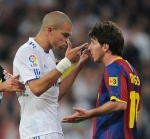OT: Alonso on English and Spanish systems
+3
S32TABLANCA
Babun
Adit
7 posters
Page 1 of 1
 OT: Alonso on English and Spanish systems
OT: Alonso on English and Spanish systems
I loved how every one, mainly english media only listened to the tackling part and missed all other great points alonso presented.Excellent interview,talks about the spanish,english systems and players
-------------------------------------------------------------------------------------------------
Xabi Alonso eases himself on to a wooden bench in a tiny dressing room at the Spanish Football Federation's headquarters in Las Rozas, north-west of Madrid, and talks –eloquently, intelligently, rationally, occasionally passionately and in Spanish. Well, mostly in Spanish. Every now and then, when there is not a natural equivalent, he turns to English where those words more properly belong. It may not be his intention but in doing so he reveals something that, on listening back, is striking.
The urban myth talks of a hundred Eskimo words for snow: words are never just words but a way of making sense of the world around us. And when it comes to football it is tempting to conclude that England and Spain are different worlds. In the time Alonso talks he uses seven English phrases. He mentions "poppy" – Fifa's inflexibility and the construction of an "unnecessary" controversy baffles him – and he mentions "the Liverpool Way". But he also talks about the "target man" and about balls: "Hollywood balls", "long balls" and "second balls". Then he mentions "tackling".
It is a theme he returns to twice; much of what he proposes crystallises in that one word: tackling. Those concepts exist in Spanish and "tackling", in English, forms part of Spain's football lexicon, while their use reflects how well Alonso integrated at Liverpool, whom he joined at 22, switching languages as smoothly as he switches play. But it also reflects something very English. Some would say a very English problem.
When Spain won Euro 2008, it ended a 44-year wait and left England alone as international football's great underachievers. Last summer England sought to end their own 44-year wait. Instead Spain won the World Cup. Brazil, Argentina, and Germany were one thing; Spain another. They had broken with their dark past. "And," Alonso says rapidly, "who's to say that England can't do the same?" But how? By pitching England against world champions who not so long ago were just like them, many of whom play in England, this game has been surrounded by questions. Two above all: What do you do right? And what do we do wrong? First, a warning. "Please don't think I'm telling you what to do or that Spain looks down on England. Far from it," the midfielder says. "I was privileged to play there and every Spaniard who's been there loves it."
Unlike some players Alonso, at 29, loves the game. There is something traditional, classic, about his approach to it and a sadness when he responds to being asked how many times he has played at Wembley with a simple "zero". "I'm looking forward to it," he says, "but I wish it was the old one with its charm – the cradle of football." He says there is no reason why England should not win. "People in England are saying we'll hammer them," he says, "but I'm not falling for that one …"
Besides, not only is there warmth, there is gratitude. Without the contribution of English football, Euro 2008 and South Africa 2010 may never have witnessed Spanish success. "Spain benefited from players going to England," Alonso says. "They had the chance to play at the highest level and were given responsibility they might not have had, experiencing a very different type of football. I listened and learnt from people like [Jamie] Carra[gher], Stevie [Gerrard], Didi Hamann and Sami Hyypia and definitely improved.
"The pace of the Premier League is different. If you can adapt it improves you. I'm not surprised [David] Silva is performing so well. He's an incredible player and if you can acclimatise you can use the speed to your advantage: if, in the middle of that frenetic pace, you're good enough to apply pausa, put the brakes on, feint and send the opponent flying 10 metres past, that gives you a real advantage. If [Juan] Mata and Silva can employ the technique they have to a game played at 100 miles an hour, they'll come back to the national team better players. International football will seem easier to them."
It seems harder for the English. "English football has developed – you can see that in the way some teams adapt their style for European competition – but it could go further," Alonso says. "There are fewer teams that play the 'typical' target man, long ball, second-ball game. Foreign players have proposed a new focus, foreign coaches too. English football has to protect what makes it wonderful but it could gain in collective ideal, in association – especially with the national team.
"It's hard to judge England in South Africa but maybe they failed to gel despite having excellent players. Sometimes it seems the English don't rate those who make the team work rather than standing out themselves. You shouldn't necessarily pick the best players; you have to have a collective identity."
In other words, don't waste 10 years trying to crowbar Gerrard and Frank Lampard into the team. Alonso dodges the bullet. "Hey," he says. "That's a press debate. I'm not saying that. But the collective ideal hasn't always been there. Paul Scholes maybe hasn't had the international career he should have. Or Michael Carrick: he makes those around him better, regardless of the fact that he's not the one who scores the most goals, or a great tackler."
There is a pause as Alonso reaches, again, the crux of the issue. A single English word he returns to that, unpacked, analysed and investigated, explains much. "I don't think tackling is a quality," he says. "It is a recurso, something you have to resort to, not a characteristic of your game. At Liverpool I used to read the matchday programme and you'd read an interview with a lad from the youth team. They'd ask: age, heroes, strong points, etc. He'd reply: 'Shooting and tackling'. I can't get into my head that football development would educate tackling as a quality, something to learn, to teach, a characteristic of your play. How can that be a way of seeing the game? I just don't understand football in those terms. Tackling is a [last] resort, and you will need it, but it isn't a quality to aspire to, a definition. It's hard to change because it's so rooted in the English football culture, but I don't understand it."
The tackle is perhaps the greatest expression of an English conception of the game – physical, epic, emotional. By definition, reactive. After every tournament knockout, some respond by moaning that England's players did not feel the shirt, that they lacked passion. Alonso admires the sentiment but does not share it. Spain's experience suggests other flaws; passion is a myth to be debunked. "Passion?" he says. "Of course it's necessary but it's more important to have footballing foundations, certainly when developing players. Passion isn't something you work on. It's more important to construct a good team, to know how you are going to play, how to read the match. You have to truly understand the game."
Less motivation, more preparation, then? "Yes," Alonso says. "And from youth level upwards. From a Spanish perspective, what matters is the ball – possession of it, knowing what to do with it and when. The identity is clear. Technique is vital and intelligence is fundamental. You need players who interpret the play, who can adapt and do not just have one concrete skill or characteristic.
"There is a difference, for example, between Spain and Real Madrid because we have a different profile of players. Yet at Madrid, despite the long passes, my role is still mostly short – to keep the circulation of the ball going. With the national team it's even more about control, pass, elaborating play, judging time, waiting for the opening without being quite so quick or so direct. Look at [Sergio] Busquets, Xavi [Hernández], Silva, [Santi] Cazorla, Mata – in small spaces they read the game, knowing when to dribble, when to go short, when to switch or open out the play. That intelligence is vital to give a collective sense to the game."
It sounds easy, obvious. It is not – not even for Spain. Nor is it a case of tearing everything up, of ignoring the qualities of England's players or its traditions. "You can change without losing the essence of British football. Growing doesn't mean renouncing your history," Alonso says. "For Spain it took a long time and reflected the players we had. The idea, the same approach, is being inculcated at Under-21 level by [the coach] Luis Milla and all the way through. It fits our footballing culture. But it has been hard to get to here. There have been doubts, you know. Big doubts.
"Luis Aragonés and then Vicente del Bosque changed Spain's approach, as did the players. We know that's our way of playing, regardless of the score. It's very well defined, we have the right players and the right mentality. But maybe if we hadn't beaten Italy on penalties at Euro 2008 the belief, the fidelity to our style, would have been lost. That was a turning point. Then you play Russia and, bam!, you destroy them. And Germany in South Africa and, bam!, our best game. That reinforced our collective identity. You think: 'This is the way we have to play, this works.'
"Success convinced us that it is the right way forward. The past doesn't count in terms of results but in terms of approach it does. It doesn't mean we'll win in the future but we know how we'll try to win. The European Championship and the World Cup reinforced the idea but you have to start with an idea."
-------------------------------------------------------------------------------------------------
Xabi Alonso eases himself on to a wooden bench in a tiny dressing room at the Spanish Football Federation's headquarters in Las Rozas, north-west of Madrid, and talks –eloquently, intelligently, rationally, occasionally passionately and in Spanish. Well, mostly in Spanish. Every now and then, when there is not a natural equivalent, he turns to English where those words more properly belong. It may not be his intention but in doing so he reveals something that, on listening back, is striking.
The urban myth talks of a hundred Eskimo words for snow: words are never just words but a way of making sense of the world around us. And when it comes to football it is tempting to conclude that England and Spain are different worlds. In the time Alonso talks he uses seven English phrases. He mentions "poppy" – Fifa's inflexibility and the construction of an "unnecessary" controversy baffles him – and he mentions "the Liverpool Way". But he also talks about the "target man" and about balls: "Hollywood balls", "long balls" and "second balls". Then he mentions "tackling".
It is a theme he returns to twice; much of what he proposes crystallises in that one word: tackling. Those concepts exist in Spanish and "tackling", in English, forms part of Spain's football lexicon, while their use reflects how well Alonso integrated at Liverpool, whom he joined at 22, switching languages as smoothly as he switches play. But it also reflects something very English. Some would say a very English problem.
When Spain won Euro 2008, it ended a 44-year wait and left England alone as international football's great underachievers. Last summer England sought to end their own 44-year wait. Instead Spain won the World Cup. Brazil, Argentina, and Germany were one thing; Spain another. They had broken with their dark past. "And," Alonso says rapidly, "who's to say that England can't do the same?" But how? By pitching England against world champions who not so long ago were just like them, many of whom play in England, this game has been surrounded by questions. Two above all: What do you do right? And what do we do wrong? First, a warning. "Please don't think I'm telling you what to do or that Spain looks down on England. Far from it," the midfielder says. "I was privileged to play there and every Spaniard who's been there loves it."
Unlike some players Alonso, at 29, loves the game. There is something traditional, classic, about his approach to it and a sadness when he responds to being asked how many times he has played at Wembley with a simple "zero". "I'm looking forward to it," he says, "but I wish it was the old one with its charm – the cradle of football." He says there is no reason why England should not win. "People in England are saying we'll hammer them," he says, "but I'm not falling for that one …"
Besides, not only is there warmth, there is gratitude. Without the contribution of English football, Euro 2008 and South Africa 2010 may never have witnessed Spanish success. "Spain benefited from players going to England," Alonso says. "They had the chance to play at the highest level and were given responsibility they might not have had, experiencing a very different type of football. I listened and learnt from people like [Jamie] Carra[gher], Stevie [Gerrard], Didi Hamann and Sami Hyypia and definitely improved.
"The pace of the Premier League is different. If you can adapt it improves you. I'm not surprised [David] Silva is performing so well. He's an incredible player and if you can acclimatise you can use the speed to your advantage: if, in the middle of that frenetic pace, you're good enough to apply pausa, put the brakes on, feint and send the opponent flying 10 metres past, that gives you a real advantage. If [Juan] Mata and Silva can employ the technique they have to a game played at 100 miles an hour, they'll come back to the national team better players. International football will seem easier to them."
It seems harder for the English. "English football has developed – you can see that in the way some teams adapt their style for European competition – but it could go further," Alonso says. "There are fewer teams that play the 'typical' target man, long ball, second-ball game. Foreign players have proposed a new focus, foreign coaches too. English football has to protect what makes it wonderful but it could gain in collective ideal, in association – especially with the national team.
"It's hard to judge England in South Africa but maybe they failed to gel despite having excellent players. Sometimes it seems the English don't rate those who make the team work rather than standing out themselves. You shouldn't necessarily pick the best players; you have to have a collective identity."
In other words, don't waste 10 years trying to crowbar Gerrard and Frank Lampard into the team. Alonso dodges the bullet. "Hey," he says. "That's a press debate. I'm not saying that. But the collective ideal hasn't always been there. Paul Scholes maybe hasn't had the international career he should have. Or Michael Carrick: he makes those around him better, regardless of the fact that he's not the one who scores the most goals, or a great tackler."
There is a pause as Alonso reaches, again, the crux of the issue. A single English word he returns to that, unpacked, analysed and investigated, explains much. "I don't think tackling is a quality," he says. "It is a recurso, something you have to resort to, not a characteristic of your game. At Liverpool I used to read the matchday programme and you'd read an interview with a lad from the youth team. They'd ask: age, heroes, strong points, etc. He'd reply: 'Shooting and tackling'. I can't get into my head that football development would educate tackling as a quality, something to learn, to teach, a characteristic of your play. How can that be a way of seeing the game? I just don't understand football in those terms. Tackling is a [last] resort, and you will need it, but it isn't a quality to aspire to, a definition. It's hard to change because it's so rooted in the English football culture, but I don't understand it."
The tackle is perhaps the greatest expression of an English conception of the game – physical, epic, emotional. By definition, reactive. After every tournament knockout, some respond by moaning that England's players did not feel the shirt, that they lacked passion. Alonso admires the sentiment but does not share it. Spain's experience suggests other flaws; passion is a myth to be debunked. "Passion?" he says. "Of course it's necessary but it's more important to have footballing foundations, certainly when developing players. Passion isn't something you work on. It's more important to construct a good team, to know how you are going to play, how to read the match. You have to truly understand the game."
Less motivation, more preparation, then? "Yes," Alonso says. "And from youth level upwards. From a Spanish perspective, what matters is the ball – possession of it, knowing what to do with it and when. The identity is clear. Technique is vital and intelligence is fundamental. You need players who interpret the play, who can adapt and do not just have one concrete skill or characteristic.
"There is a difference, for example, between Spain and Real Madrid because we have a different profile of players. Yet at Madrid, despite the long passes, my role is still mostly short – to keep the circulation of the ball going. With the national team it's even more about control, pass, elaborating play, judging time, waiting for the opening without being quite so quick or so direct. Look at [Sergio] Busquets, Xavi [Hernández], Silva, [Santi] Cazorla, Mata – in small spaces they read the game, knowing when to dribble, when to go short, when to switch or open out the play. That intelligence is vital to give a collective sense to the game."
It sounds easy, obvious. It is not – not even for Spain. Nor is it a case of tearing everything up, of ignoring the qualities of England's players or its traditions. "You can change without losing the essence of British football. Growing doesn't mean renouncing your history," Alonso says. "For Spain it took a long time and reflected the players we had. The idea, the same approach, is being inculcated at Under-21 level by [the coach] Luis Milla and all the way through. It fits our footballing culture. But it has been hard to get to here. There have been doubts, you know. Big doubts.
"Luis Aragonés and then Vicente del Bosque changed Spain's approach, as did the players. We know that's our way of playing, regardless of the score. It's very well defined, we have the right players and the right mentality. But maybe if we hadn't beaten Italy on penalties at Euro 2008 the belief, the fidelity to our style, would have been lost. That was a turning point. Then you play Russia and, bam!, you destroy them. And Germany in South Africa and, bam!, our best game. That reinforced our collective identity. You think: 'This is the way we have to play, this works.'
"Success convinced us that it is the right way forward. The past doesn't count in terms of results but in terms of approach it does. It doesn't mean we'll win in the future but we know how we'll try to win. The European Championship and the World Cup reinforced the idea but you have to start with an idea."
 Re: OT: Alonso on English and Spanish systems
Re: OT: Alonso on English and Spanish systems
I'm happy to know Xabi is a tactical general as well 
He should write a book after his retirement

He should write a book after his retirement


Babun- Fan Favorite

- Club Supported :

Posts : 7221
Join date : 2011-06-05
 Re: OT: Alonso on English and Spanish systems
Re: OT: Alonso on English and Spanish systems
babun1024 wrote:I'm happy to know Xabi is a tactical general as well
He should write a book after his retirement
Nah, hes too humble and respectful. Not enough arguments to fill the book.

S32TABLANCA- First Team

- Club Supported :

Posts : 3318
Join date : 2011-06-05
 Re: OT: Alonso on English and Spanish systems
Re: OT: Alonso on English and Spanish systems
Leave Xavi out of this thread. Off the field, Xabi>>>>>>>>>>>>>>>>>>>>>>>>>>>>>>>>>>>>>>>>>>>>>>>>>>>>>>>>>>>>>>>>>>>>>>>>>>>>>>>>>> XaviSaetablanca wrote:babun1024 wrote:I'm happy to know Xabi is a tactical general as well
He should write a book after his retirement
Nah, hes too humble and respectful. Not enough arguments to fill the book.

Babun- Fan Favorite

- Club Supported :

Posts : 7221
Join date : 2011-06-05
 Re: OT: Alonso on English and Spanish systems
Re: OT: Alonso on English and Spanish systems
Xavi is a arrogant prick off the pitch. 


Pedram- Fan Favorite

- Club Supported :

Posts : 7468
Join date : 2011-06-06
Age : 33
 Re: OT: Alonso on English and Spanish systems
Re: OT: Alonso on English and Spanish systems
Xabi to take over coaching at Madrid one day

daneq- Starlet

- Club Supported :

Posts : 529
Join date : 2011-06-08
Age : 36
 Re: OT: Alonso on English and Spanish systems
Re: OT: Alonso on English and Spanish systems
I see Xabi becoming a great coach one day, he'll probably start his career with Sociedad and get em a league, when he does I hope we get him as our coach 


H.A.- Starlet

- Club Supported :

Posts : 776
Join date : 2011-08-04
 Re: OT: Alonso on English and Spanish systems
Re: OT: Alonso on English and Spanish systems
Awesome thanks for posting

hrealmadrid- First Team

- Club Supported :

Posts : 2013
Join date : 2011-06-06
 Re: OT: Alonso on English and Spanish systems
Re: OT: Alonso on English and Spanish systems
I didnt mention Xavi at all bro...

S32TABLANCA- First Team

- Club Supported :

Posts : 3318
Join date : 2011-06-05
 Similar topics
Similar topics» Rafas analysis on English and Spanish youth system
» Ze Germans excel, the Italians and English bomb and the Spanish hold their own
» Rafa Benitez on Systems
» Battle of youth systems
» Study: World's most productive youth systems
» Ze Germans excel, the Italians and English bomb and the Spanish hold their own
» Rafa Benitez on Systems
» Battle of youth systems
» Study: World's most productive youth systems
Page 1 of 1
Permissions in this forum:
You cannot reply to topics in this forum








» The Official PlayStation 1 Gaming Threads
» The US Politics Thread
» Miguel "Miguelito" Gutierrez
» David Coote appreciation thread
» The Official Dwayne Wade <<<<<< you thread
» Soundtrack/Epic Music Appreciation Thread
» Leicester have sacked Claudio Ranieri
» Ruben Amorim Sack Watch
» Chillout Music!
» GL NBA fantasy 24-25
» The Music Room
» Manchester United Part V / ETH Sack Watch